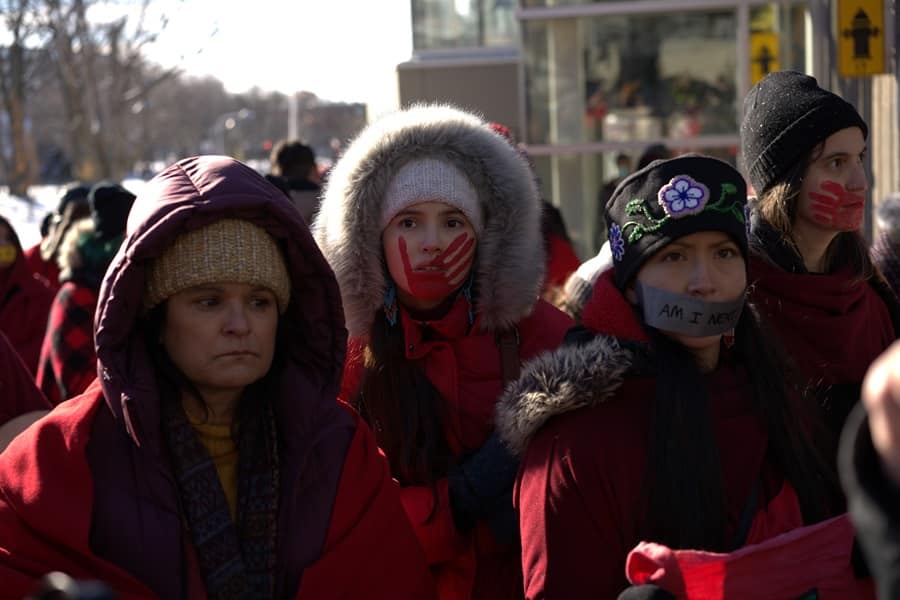
Social Justice in Crime Fiction
by Deborah L. Cannon
Armand Gamache of the Sûreté du Québec (Quebec Provincial Police) sees an Indigenous woman seated forlornly outside a hotel, which he later learns she believes is the National Assembly of Ottawa. He asks her what’s wrong. She tells him that she is Cree and that her son is missing.
That, in fact, many Cree boys are missing. They have been recruited by the government to do evil acts. Then killed to erase any traces leading back to those responsible, and their bodies are disappeared.
Corruption is bubbling at the highest levels of the police force. Meanwhile Chief Inspector Gamache finds himself in the village of Three Pines. As his team solves murders in the tiny village, the corruption grows in the background. We meet the members of his team. The devoted agents and the rookie outlier. We meet the village residents. A gay couple, a black bookstore owner, a pair of emotionally stunted artists, and a foul-mouthed crone of a poet. Each has a story to tell about love, loyalty and altruism. Greed, jealousy and fear.
Crime fiction like Louise Penny’s beloved Three Pines mysteries reveals faults in society. It exposes the dark corners where society hides its flaws. Whether the narrative is a classic detective story or a murder mystery, a crime thriller or a cozy, these types of stories allow for a deep dive into human nature.
The Mystery of Social Justice
The TV adaptation of Three Pines switches the backstory from missing Aboriginal men to missing Aboriginal women. As Gamache makes a promise to a Mohawk family to find a woman named Blue Two-Rivers, the authorities look the other way. The message is the same whether the missing Indigenous person is a man or a woman. The murders of these people are not important to the police until Chief Inspector Gamache steps in.
Louise Penny’s novel, A Fatal Grace, follows Gamache and his team as they investigate a socialite’s murder. CC de Poiters is a wealthy white woman. Her death mobilizes the police to find the killer, while the disappearance of Blue Two-Rivers is recklessly pinned on a convenient Indigenous man.
In Victoria Thompson’s Gaslight Mysteries, each book reflects a New York City neighborhood at the turn of the 20th century. From abandoned pregnant girls in abusive situations, to ethnic groups on the wrong side of an iffy justice system, policemen take on cases depending on how much a victim’s family is willing to pay.
Thompson’s protagonist is midwife Sarah Brandt. She takes on the NYC police department—especially one particular cop, Frank Malloy—to help underprivileged women of all ethnicities and religions while solving murders. Malloy himself, an Irishman, is considered a second-rate citizen among his peers. When he decides to help Sarah, he can expect no official help.
Chinese men in New York City were forbidden to bring wives from China, so they married Irish women who arrived in America alone. This is the premise of Victoria Thompson’s book, Murder in Chinatown. The children of these mixed marriages were treated badly. So, when a young girl of mixed descent turns up dead, the police ignore it. Except for Frank Malloy at the urging of Sarah Brant.
People read mysteries like the Three Pines and Gaslight Mysteries for entertainment. But beneath the enjoyment of solving a twisty puzzle, readers crave justice. And it is in these diverse tales of murder that they find it.
Criminal Social Values
The world should value all people—despite gender, race, religion, age, sexual orientation or social and economic class. Or physical or mental ability. But sometimes, it doesn’t.
Grayson Sykes is a female private detective in Rachel Howzell Hall’s crime thriller And Now She’s Gone. Grayson is searching for Isabel Lincoln, a missing woman, who may or may not wish to be found. Her client is the woman’s superficially loving boyfriend who turns out to be an abuser. He probably wouldn’t even care what happened to her if it wasn’t for the fact that she disappeared with his dog. Grayson also has an abusive partner. And as parallel stories develop between Grayson and the missing woman, a tale unravels of the limited options women have in a society afraid to admit to one of its most shameful secrets. Domestic abuse.
In Nancy Jooyoun Kim’s The Last Story of Mina Lee, a Korean woman goes to the U.S. in search of a better life. A war orphan and an undocumented immigrant, Mina is estranged from her American daughter who barely speaks her mother’s language. When daughter Margot fails to hear from Mina, she visits her mother’s home in Koreatown only to find her dead. Is it murder? In flashbacks we learn of the dark silence and the lost connections between generations. As American immigrants fight prejudice while juggling their old culture with the new, their children strive to find their own identity. Margot learns all about her mother’s past—the struggles and the secrets—and her own shortcomings while trying to discover how and why her mother died.
Rhythm and Blues star Kory Fields is dead. What started out as a dream for aspiring young singer, Enchanted Jones, is now a nightmare. Enchanted Jones wakes up covered in blood with no memory of how the blood got there. Or even where she is. The police claim that Kory Fields, her lover, manager and benefactor was murdered. And she—a seventeen-year-old black girl—is the suspect! Grown, by Tiffany D. Jackson is a YA mystery inspired by the true story of R. Kelly, a sexual abuser, whose horrific actions were largely ignored by the authorities of his time. In this murder mystery that becomes a tale of sexual and emotional exploitation, Jackson dares us to confront a disturbing issue: the abuse of the young because they are poor, female and starstruck. And the charming abusers who get away with it because they are rich, manipulative and powerful.
A good crime story is the perfect forum for exposing society’s ills. It can entertain and at the same time teach us something about ourselves.
Empathy Through Fictional Violence
In fiction, people kill for the American Dream. What the American Dream is differs from person to person. But when people turn to crime to achieve it, we are forced to see its dark side. In whatever permutation—the pursuit of wealth, career, relationships, fame, money or power—we are ultimately faced with the viewpoint of its victims.
Will Trent is a police procedural TV crime drama based on Karin Slaughter’s novels of the same name. A backstory for the Georgia Bureau of Investigation’s Deputy Director, Amanda Wagner, shows that for a woman success is hard won. As a young rookie she stopped a man for a routine traffic stop sign violation. The man, twice her size, beat her up and almost raped her. When she reported the incident to her police captain father, he ordered her to forget about it. The perp, a serial rapist and murderer, got away Scott free, not only for the assault on Amanda, but for all the other horrors he committed because victims were too afraid to testify. Amanda plants cocaine on him and he is imprisoned for thirty years. After release, he is determined to get revenge. He frames Amanda for murder for which she is exonerated. But before he can kill her, Trent shoots him.
Our deep empathy for Amanda is the only way we can reconcile that she, a high-level law enforcement officer, committed a crime in order to get justice. After all, what was she supposed to do when the justice system failed?
Only in crime fiction can we sanction this form of justice.
The Dark and the Light
In real life justice sometimes fails. And to bolster our belief in a fair and benign world, a mystery writer invents scenarios where good prevails. Louise Penny pits her detective Armand Gamache against a truly formidable foe, Sylvain Francoeur, who is the epitome of evil. As Chief Superintendent—and Gamache’s boss—he represents law and order and should have been someone we could trust. Gamache on the other hand is the quintessence of good. A man of compassion, and reason. A man who listens. And thereby finds the truth.
In the Gaslight Mysteries, the widower Malloy, a hardboiled police officer and father of a deaf son, falls for the brilliant and benevolent midwife Sarah Brandt. She shows him that his son’s hearing deficit doesn’t have to stunt his life. Her remarkable people skills and adeptness at solving murders brings out his best qualities. Eventually they marry and become a crime-fighting duo.
Tales of murder and other heinous crime highlight humanity’s conflict with good and evil. Through the criminal mind we see the corruption of thought and the degradation of the soul. Through the detective we see courage, fairness and decency. And the best of what makes us human.
The fictional exploration of violence, whether hardboiled or soft, makes us sensitive to the predicament of others. We are urged to imagine a society where our actions have consequences. What we do affects the lives of others.
If we believed that fiction was meant to improve our minds, no one would ever pick up a novel. But when we are engrossed in a good murder mystery, we experience the kind of world we should all try to live in. One that forces us to recognize, not so much how we are different, but how much we are the same.
About the Author
Deborah L. Cannon’s interest in crime fiction as a vehicle for social justice came from her Chinese immigrant grandfather who in 1924 fought a racist law forbidding him from hiring white women for his restaurant. She is an eclectic writer who has contributed from the Chicken Soup for the Soul franchise to Mystery and Suspense Magazine. With a few SF stories in between. She holds degrees in Anthropology and Museum Studies. Her most recent work is the international mystery and crime novel series Fresco Nights.

More Crime Thriller Features
Political Thriller Protagonists
What are the qualities of a good protagonist in a political thriller?
Spy Thriller Villains
Unraveling the Bad Guys of Espionage Fiction
Political Thrillers for Independence Day
4th of July Political Thrillers



